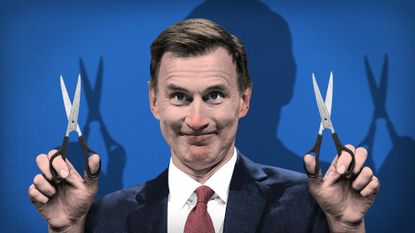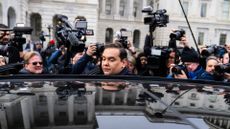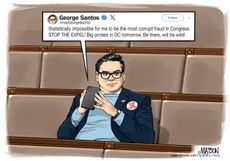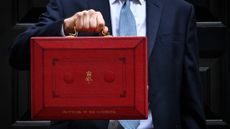Five key takeaways from Jeremy Hunt's Autumn Statement
Benefits rise with higher inflation figure, pension triple lock maintained and National Insurance cut

Following weeks of anticipation and speculation, the chancellor has delivered his plans for the UK's economy.
The Autumn Statement included "110 different measures to help grow the British economy", according to Jeremy Hunt. His tone at today's big reveal in the Commons was "very different" from the "sombre approach he adopted last year", said Sky News correspondent Amanda Akass. Back then, he was trying to fix "the damage of his predecessor's so-called mini budget".
But the outlook now appears brighter, based on latest forecasts for the country's economic growth, provided by the Office for Budget Responsibility (OBR). Hunt announced that the Treasury's independent fiscal watchdog was now predicting that inflation will fall from the current level of 4.6% to 2.8% next year, and then continue falling to below the Bank of England's 2% target in 2025.
Subscribe to The Week
Escape your echo chamber. Get the facts behind the news, plus analysis from multiple perspectives.

Sign up for The Week's Free Newsletters
From our morning news briefing to a weekly Good News Newsletter, get the best of The Week delivered directly to your inbox.
From our morning news briefing to a weekly Good News Newsletter, get the best of The Week delivered directly to your inbox.
And the UK economy is expected to grow by 0.6% this year, contradicting last year's forecasts that it would shrink by 1.4%. The UK has "grown faster than the euro area", said Hunt, who added that "our plan for the British economy is working, but the work is not done".
National Insurance cuts
Hunt previously ruled out cuts to National Insurance (NI), over fears of undermining the push to bring down inflation, but has now put them "at the heart of his budget", said The Times.
Employees earning more than £12,570 per year currently pay 12% on earnings up to £50,200. The rate will be cut to 10%, one percentage point further than many were predicting.
The cut is worth about £450 a year for the average worker earning £35,400, said the chancellor, who will introduce emergency legislation to bring the change into effect from the start of January rather than April.
Hunt also announced that from April, Class 4 NI for self-employed workers will be reduced from 9% to 8%. Cutting the rate by 1% "will save around two million self-employed people an average of £350 a year", he told the Commons.
The government will also abolish Class 2 NI, a flat rate of £3.45 a week paid by self-employed people earning above the threshold, entitling them to a state pension. The move will save the average self-employed person £192 a year, Hunt said.
Shadow chancellor Rachel Reeves argued that the cuts would "not remotely" compensate for tax increases already imposed by the Conservatives. The Resolution Foundation think tank said that most people would still pay more NI overall, because of the impact of the decision to freeze the threshold at which people pay it.
National living wage raised
National living wage will increase by 9.8%, rising from £10.42 to £11.44 an hour from April, the chancellor confirmed.
Hunt said the increase equated to a boost of more than £1,800 a year for a full-time worker, "the third-largest increase in real terms since the living wage was introduced in 2016".
The hike of just over £1 an hour means the Tories will have met their 2019 manifesto commitment to eradicate low pay by 2024, according to the Low Pay Commission, which advises the government on minimum wages.
Permanent tax break for businesses
The £10 billion-a-year tax break for businesses that invest in equipment and technology is being made permanent.
The break was introduced in the spring and was slated to be in place for three years, but Hunt said today that falling inflation and borrowing had paved the way for the extension.
This is Hunt's "flagship reform", government insiders told the Financial Times, and is reportedly known inside the Treasury as the "Big Daddy" of business tax cuts. Extending the "full expensing" scheme – which allows a company to deduct all spending on IT equipment, plant or machinery from its taxable profits – indefinitely was "a crucial demand of business groups".
Hunt said the OBR believes making it permanent will increase annual investment by roughly £3 billion a year.
Benefits raised and reformed
Hunt has increased Universal Credit benefits by 6.7%, in line with September's higher inflation, after rejecting proposals to use October's lower inflation figure of 4.6%.
The chancellor claimed that the increase, which comes into effect from April, will be worth an "average increase of £470 for 5.5 million households".
Local housing allowance will also be unfrozen, and the rate will be increased to the "30th percentile of local market rents", he said.
Using October's inflation figure would have saved £3 billion, according to The Times, but would have "hit nine million households struggling to cope with the cost of living".
The chancellor also announced a much-trailed reform of the benefits system, saying ministers would revise the "Fit Note process" and the Work Capability Assessment, in order to push people into seeking treatment rather than time off work.
State pension triple lock maintained
The full state pension will increase by 8.5%, in line with total average earnings, to £221.20 a week.
"This is one of the largest-ever cash increases to the state pension, showing a Conservative government will always back our pensioners," Hunt said.
By rejecting proposals to strip bonuses from September's total earnings calculation, the chancellor kept the controversial pension triple lock in place, guaranteeing that pensions will rise by whichever is highest of three metrics: inflation; earnings over the previous year; or 2.5%.
Hunt also said he was considering allowing employees to choose where their pension contributions from employers went, and that his ultimate goal was to get pensions into bigger funds.

Continue reading for free
We hope you're enjoying The Week's refreshingly open-minded journalism.
Subscribed to The Week? Register your account with the same email as your subscription.
Sign up to our 10 Things You Need to Know Today newsletter
A free daily digest of the biggest news stories of the day - and the best features from our website
Harriet Marsden is a writer for The Week, mostly covering UK and global news and politics. Before joining the site, she was a freelance journalist for seven years, specialising in social affairs, gender equality and culture. She worked for The Guardian, The Times and The Independent, and regularly contributed articles to The Sunday Times, The Telegraph, The New Statesman, Tortoise Media and Metro, as well as appearing on BBC Radio London, Times Radio and “Woman’s Hour”. She has a master’s in international journalism from City University, London, and was awarded the "journalist-at-large" fellowship by the Local Trust charity in 2021.
-
 Today's political cartoons - December 2, 2023
Today's political cartoons - December 2, 2023Cartoons Saturday's cartoons - governors go Gotham, A.I. goes to the office party, and more
By The Week US Published
-
 10 things you need to know today: December 2, 2023
10 things you need to know today: December 2, 2023Daily Briefing Death toll climbs in Gaza as airstrikes intensify, George Santos expelled from the House of Representatives, and more
By Justin Klawans, The Week US Published
-
 5 hilarious cartoons about the George Santos expulsion vote
5 hilarious cartoons about the George Santos expulsion voteCartoons Artists take on Santa versus Santos, his X account, and more
By The Week US Published
-
 2023: the year of labor strikes
2023: the year of labor strikesThe Explainer Workers from Hollywood to the auto lines walked off the job this year
By Justin Klawans, The Week US Published
-
 Companies cut back on benefits
Companies cut back on benefitsFeature And more of the week's best financial insight
By The Week Staff Published
-
 Would tax cuts benefit the UK economy?
Would tax cuts benefit the UK economy?Today's Big Question More money in people's pockets may help the Tories politically, but could harm efforts to keep inflation falling
By The Week UK Published
-
 Bank accounts caught up in red tape
Bank accounts caught up in red tapeFeature And more of the week's best financial insight
By The Week US Published
-
 Autumn Statement predictions: will Hunt deliver big-ticket tax cuts?
Autumn Statement predictions: will Hunt deliver big-ticket tax cuts?The Explainer Chancellor urged to use fiscal 'headroom' to slash inheritance tax and stamp duty
By The Week UK Published
-
 Don’t count on working forever
Don’t count on working foreverFeature And more of the week's best financial insight
By The Week US Published
-
 Is a Georgist tax on land the solution to Detroit's housing crisis?
Is a Georgist tax on land the solution to Detroit's housing crisis?Today's Big Question The plan would replace the city's current property tax system with one based on the value of land itself
By Justin Klawans, The Week US Published
-
 Bankman-Fried: A con artist's day of reckoning
Bankman-Fried: A con artist's day of reckoningFeature How the crypto king's downfall might actually begin to restore trust in the crypto market
By The Week Staff Published










